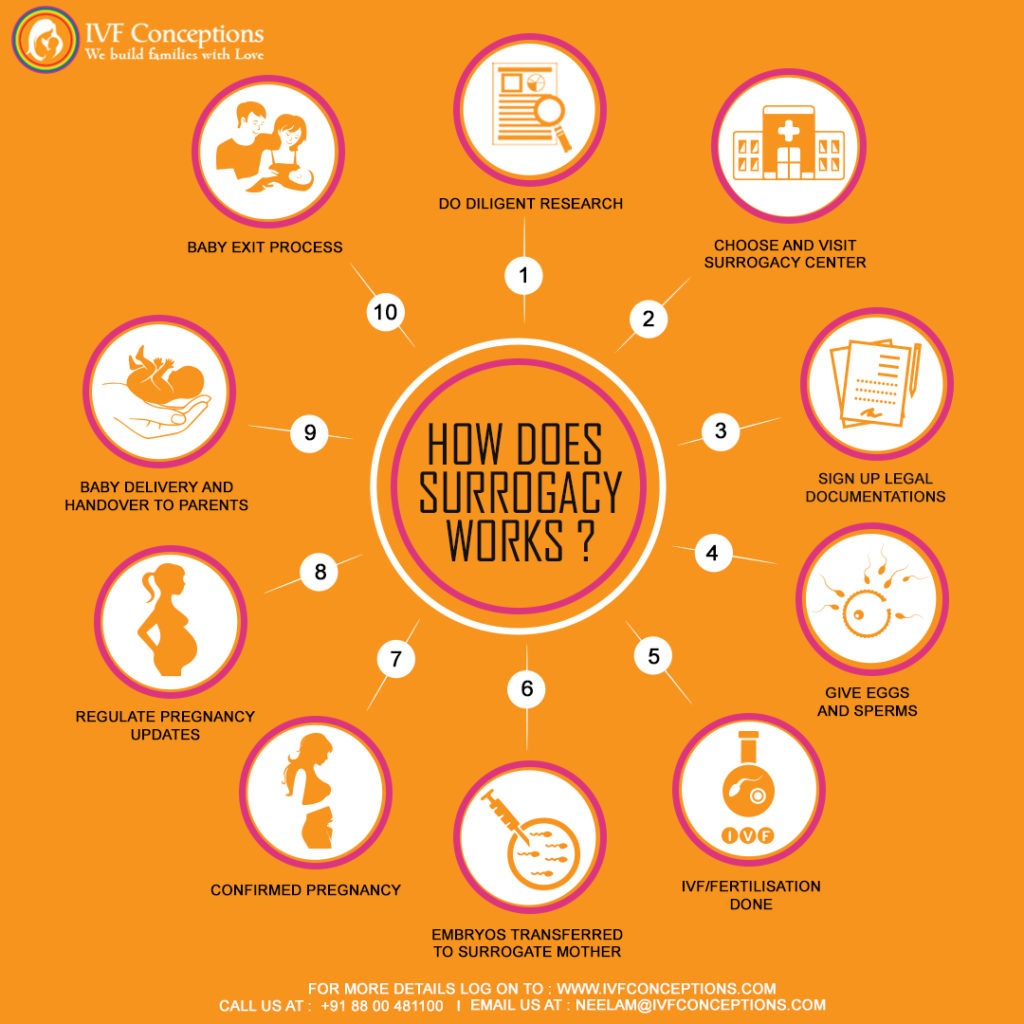How Does Surrogate Mother Process Work

How does the surrogate mother process work?
At IVF Conceptions, we understand that the surrogacy process is a significant and life-changing decision for both surrogate mothers and intended parents. We are committed to providing comprehensive support and guidance throughout this incredible journey. In this guide, we’ll take you through every step of the surrogacy process, making sure you have a clear understanding of what to expect and how we can make your parenthood dreams come true. So, let’s dive into how the surrogate mother process works.
How does the surrogate mother process work?
Here is a step-by-step surrogacy process for a surrogate mother
#1. Pre-Screening: Your First Step Towards Surrogacy
The surrogacy journey begins with a thoughtful and thorough pre-screening process. At IVF Conceptions, we believe that every surrogate mother is unique, and it’s important to make sure that surrogacy is the right path for you. Here’s what you can expect at this stage:
- Alternate Application
The first step is to complete our surrogate application. This user-friendly application only takes about 10 minutes to fill out. You will provide us with your personal information, health and pregnancy history, financial details, and information about your support network.
- Screening and Background Check
Once we receive your application, our dedicated team will review it immediately. If you are approved, a Surrogate Advisor will contact you within 24 hours. We will also request and review your medical records at this stage.
- Access to the Surrogate Portal
Upon approval, you will have access to our Surrogate Portal, where you will find valuable resources and support throughout your journey. Your Surrogate Advisor will work closely with you to ensure a seamless experience.
#2. Consultation: Connecting with Your Surrogacy Team
Your surrogacy consultation is an important step in the process, allowing us to get to know you better and address any questions or concerns you may have. Here’s what you can expect at this stage:
- Video Call a Social Worker
During the consultation, you will have an in-depth video interview with one of our experienced social workers. This interview usually takes about 2 to 2 ½ hours and covers various aspects of your motivation to become a surrogate, your support system, pregnancy history, family, and more.
- Compensation for Your Time
We understand that the consultation may require some time in your day. As a thank you, all alternate applicants who complete this phase will receive a $500 advancement from their base fee after matching, to compensate for any lost wages and child care arrangements.
- Main Support Person
Every surrogate mother needs to have Primary Support with them on this journey. This support person plays an important role in accompanying you to appointments, offering emotional support, and being there for you every step of the way.
#3. Matching: Finding the Perfect Fit
Matching is an exciting stage where you will be introduced to the intended parents you will be helping. Here’s how the matching process works:
- Change Profile
Our Matching Specialists will work closely with you to find the perfect parent match. You will exchange profiles with the intended parents, allowing both parties to learn more about each other and their surrogacy journey.
- Video Call to Intended Parents
If both parties are interested, a video call can be arranged to get to know each other better. This call is a unique opportunity to discuss your expectations, hopes, and dreams for the surrogacy journey.
- The Joy of Matching
Once the call is over, and both parties feel a connection, you’re officially a match! This is a significant milestone in your surrogacy journey.
#4. Medical Examinations and Legal Contracts: Ensuring a Healthy Start
As you progress, medical examination and legal contracts become important parts. Here’s what you need to know:
- Medical Screening
Your first physical contact with the intended parents usually occurs during the medical examination at the IVF clinic. This includes a physical exam, sonogram, blood tests, and discussions about medications. This is an important moment in building a closer relationship with the intended parents.
- Legal Contracts
Legal contracts will be negotiated and drafted with a lawyer to ensure that all rights and responsibilities of the parties are clearly defined. This step usually takes 2 to 3 months.
#5. Tracking Appointments and Embryo Transfer: The Road to Pregnancy
This part includes attending local follow-up appointments and the important embryo transfer process:
- Tracking appointments
You will start your alternative medications and attend local monitoring appointments, making sure your body is responding correctly to the fertility medication.
- Embryo Transfer
Embryo transfer will require a trip to Intended Parents’ IVF clinic. It is a short process, and you will receive instructions from the IVF doctor.
#6. Pregnancy: A Journey of Love and Support
The pregnancy stage involves various medical tests and constant communication with the intended parents:
- Beta Tests and Ultrasounds
You will have beta tests to confirm the progress of the pregnancy and an ultrasound at about 6-7 weeks to confirm the heartbeat(s).
- Standard Appointments
Starting at week 10, you will begin regular appointments with your OBGYN, and this is a great time to strengthen your relationship with the intended parents.
#7. Delivery Day: A Good Start
As the journey nears its end, preparations for the delivery become important:
- Birth Plan
You and the intended parents will work on a birth plan that outlines various aspects, such as who will attend the birth, who will be in the delivery room and other preferences.
- Said goodbye
Saying goodbye to the baby you carried is undoubtedly emotional, but it’s also a beautiful moment of fulfillment. Many surrogates maintain a long-term relationship with the intended parents, who continue to support the growth of their surrogate baby.
More resources:
Surrogacy requirements
Cost of surrogate mother
How to choose Surrogacy agencies
Surrogacy laws by state
Qualifications of surrogate mother
International surrogacy countries
Cheapest country for surrogacy
Step-by-step surrogacy process for surrogate mother
Conclusion
Surrogate mothers are the true heroes of any surrogacy process. It is because of their kindness and desire to help others, make any surrogacy journey successful.
If you are considering becoming a surrogate or starting a surrogacy journey, we invite you to explore the possibilities with us. Apply today and take the first step toward a rewarding surrogacy experience.
If you want to learn more about IVF, Egg Donation, or surrogacy services worldwide, check out more on our website at IVF Conceptions. We offer legally secure and affordable surrogacy consulting services to build families for free.

FAQs For How Does The Surrogacy Process Work?
What is surrogacy?
Surrogacy is an arrangement where a woman carries and gives birth to a child for another person or couple, who become the child’s legal parents.
How does the process of choosing a successor happen?
The surrogate selection process involves matching the intended parents with a suitable surrogate based on compatibility, medical assessments, and legal agreements.
Are there different types of surrogacy?
Yes, there are two main types of surrogacy: traditional surrogacy (using the surrogate’s own eggs) and gestational surrogacy (using the intended mother or donor eggs).
What are the legal aspects of surrogacy?
The legal aspects of surrogacy vary by location but often include contracts, parental rights, and regulations to protect all parties involved.
How is a surrogate mother paid?
Surrogate mothers are paid for their time, effort, and potential risks, but compensation varies widely and may include medical expenses.
Can the biological parents choose the surrogate?
Yes, biological parents can usually choose a surrogate based on a variety of criteria, including health, personality, and compatibility.
What medical procedures are involved?
Medical surrogacy procedures include in vitro fertilization (IVF) to create embryos, embryo transfer to a surrogate, and prenatal care.
How long does the surrogate mother process take?
The duration of the surrogacy process can vary but usually takes about 9-15 months, similar to a natural pregnancy.
What are the emotional aspects of surrogate motherhood?
The emotional aspects for the surrogate mother can be complex, involving attachment to the child and the psychological challenges of carrying the child for another person.
What are the risks associated with surrogacy?
Risks associated with surrogacy include medical complications, legal disputes, and emotional stress for all parties involved. Proper planning and support can reduce these risks.
References used:
American Society for Reproductive Medicine – Guidelines on Surrogacy
American Pregnancy Association – Surrogacy Process
S. Department of State – Surrogacy Laws
About the Author:
Neelam Chhagani, MA (Counselling Psychology), PGD (Mental Health), and Holistic Infertility and Third-Party Reproduction Consultant.
Member of the European Fertility Society, Best Surrogacy Blogger of 2020, with 200 dedicated blogs and leading contributor on Quora for Surrogacy.
Highly respected, authoritative and trusted professional with 13 years of experience in international surrogacy. Advocate for Secure, Legal, and Affordable International Surrogacy.
Learn more:
https://www.ivfconceptions.com/neelam-chhagani-surrogacy-consultant/
https://www.linkedin.com/in/neelam-chhagani-92892229/
https://www.quora.com/profile/Neelam-Chhagani






